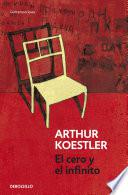Memorias: Flecha en el azul / La escritura invisible
Obras

El cero y el infinito
Arthur KoestlerFrases célebres de Arthur Koestler
“El odio, como el amor, solo florece donde hay algo en común, donde existe un común denominador.”
Memorias: Flecha en el azul / La escritura invisible
“El valor consiste en no permitir que tus temores influyan sobre tus actos.”
Memorias: Flecha en el azul / La escritura invisible
Fuente: [Albaigès Olivart] (1997), p. 341.
Fuente: Prólogo a Janus, A Summing Up
Darkness at Noon
Frases sobre el coraje. de Arthur Koestler
“En la ecuación social, el valor de una sola vida es cero; en la ecuación cósmica, es infinito.”
Memorias: Flecha en el azul / La escritura invisible
Memorias: Flecha en el azul / La escritura invisible
Arthur Koestler Frases y Citas
“Tardé muchos años en descubrir que el inquieto viajero solo tenía una meta: huir de sí mismo”
Memorias: Flecha en el azul / La escritura invisible
“Hay dos clases de valentía: la del valiente y la del cobarde”
Memorias: Flecha en el azul / La escritura invisible
“Las metáforas atrevidas de ayer son los clisés de hoy.”
Fuente: [Albaigès Olivart] (1997), p. 564.
Fuente: The Heel of Achilles (1974).
Fuente: [Albaigès Olivart] (1997), p. 304.
Fuente: El cero y el infinito (1940).
“Es imposible formular una política a fuerza de pasión y desesperanza.”
Fuente: El cero y el infinito (1940).
Fuente: [Albaigès Olivart] (1997), p. 387.
Fuente: El yogi y el comisario.
“Quizá nuestra civilización actual no está muerta, sino solamente ávida de sueños.”
Fuente: [Albaigès Olivart] (1997), p. 558.
Fuente: [Albaigès Olivart] (1997), p. 105.
Fuente: The Sleepwallkers, 1964.
“Lo que le hace falta a la revolución no son héroes, sino funcionarios de acero.”
o «El revolucionario es el burócrata de la utopía».
Fuente: [Albaigès Olivart] (1997), p. 505.
Fuente: [Ortega Blake] (2013), p. 3644.
Fuente: [Ortega Blake] (2013), p. 3648.
Fuente: Cruzada sin cruz, 1943.
Fuente: [Albaigès Olivart] (1997), p. 259.
Fuente: Le cheval dans la locomotive
“Dos medias verdades no hacen una verdad y dos medias culturas no hacen una cultura.”
Fuente: [Señor] (1997), p. 112.
Fuente: [Albaigès Olivart] (1997), p. 123.
Fuente: El fantasma en la máquina.
“El que comprende y perdona, ¿de dónde sacará un móvil para la acción?”
Fuente: [Albaigès Olivart] (1997), p. 304.
Fuente: El cero y el infinito (1940).
Arthur Koestler: Frases en inglés
A Challenge to 'Knights in Rusty Armor, The New York Times, (14 February 1943).
Contexto: Indeed, the ideal for a well-functioning democratic state is like the ideal for a gentleman's well-cut suit — it is not noticed. For the common people of Britain, Gestapo and concentration camps have approximately the same degree of reality as the monster of Loch Ness. Atrocity propaganda is helpless against this healthy lack of imagination.
Epilogue
The Sleepwalkers: A History of Man's Changing Vision of the Universe (1959)
Contexto: The uomo universale of the Renaissance, who was artist and craftsman, philosopher and inventor, humanist and scientist, astronomer and monk, all in one, split up into his component parts. Art lost its mythical, science its mystical inspiration; man became again deaf to the harmony of the spheres. The Philosophy of Nature became ethically neutral, and "blind" became the favourite adjective for the working of natural law. The space-spirit hierarchy was replaced by the space-time continuum.... man's destiny was no longer determined from "above" by a super-human wisdom and will, but from "below" by the sub-human agencies of glands, genes, atoms, or waves of probability.... they could determine his fate, but could provide him with no moral guidance, no values and meaning. A puppet of the Gods is a tragic figure, a puppet suspended on his chromosomes is merely grotesque.
Return Trip to Nirvana from Sunday Telegraph (1967).
Contexto: I profoundly admire Aldous Huxley, both for his philosophy and uncompromising sincerity. But I disagree with his advocacy of 'the chemical opening of doors into the Other World', and with his belief that drugs can procure 'what Catholic theologians call a gratuitous grace'. Chemically induced hallucinations, delusions and raptures may be frightening or wonderfully gratifying; in either case they are in the nature of confidence tricks played on one's own nervous system.
The Act of Creation, London, (1970) p. 253.
Contexto: Einstein's space is no closer to reality than Van Gogh's sky. The glory of science is not in a truth more absolute than the truth of Bach or Tolstoy, but in the act of creation itself. The scientist's discoveries impose his own order on chaos, as the composer or painter imposes his; an order that always refers to limited aspects of reality, and is based on the observer's frame of reference, which differs from period to period as a Rembrant nude differs from a nude by Manet.
Fuente: Drinkers of Infinity: Essays 1955-1967 (1967).
“History had a slow pulse; man counted in years, history in generations”
Fuente: Darkness at Noon
“The more original a discovery the more obvious it seems afterwards.”
The Act of Creation (1970).
Epilogue
The Sleepwalkers: A History of Man's Changing Vision of the Universe (1959)
Epilogue [footnote referenced E.T. Whittaker's Space and Spirit (1946)]
The Sleepwalkers: A History of Man's Changing Vision of the Universe (1959)
Writers at Work, ed. George Plimpton (1986).
Epilogue
The Sleepwalkers: A History of Man's Changing Vision of the Universe (1959)
The Sleepwalkers: A History of Man's Changing Vision of the Universe (1959)
“God seems to have left the receiver off the hook, and time is running out.”
The Ghost in the Machine (1967).
as quoted by Michael Grossman in the The First Nonlinear System of Differential and Integral Calculus (1979).
The Sleepwalkers: A History of Man's Changing Vision of the Universe (1959)
